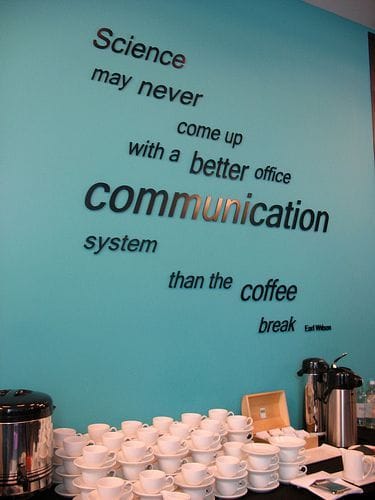The last few days we have seen a number of blog posts reflecting on the pros and cons of science blogging networks. Bora Zivkovic last week announced his departure from scienceblogs.com, and in his must-read post reflected on the history of science blogging (A Farewell to Scienceblogs: the Changing Science Blogging Ecosystem). Richard Grant on Saturday wrote down his thoughts On Nature Network. Cameron Neylon draws an interesting parallel between science networks and scientific journals (The Nature of Science Blog Networks). And Katherine Haxton compared her experience blogging on Nature Network vs. blogging on her own blog (Science Blogging Networks).
My thoughts on this: it's complicated. I don't see how blogging networks (or any particular network) can be inherently better or worse than setting up your own blog. It's an individual decision. Right now I like to write as part of a blogging network. But I may change my mind and write for a different network, or on an individually hosted blog. I would like to add three considerations to the discussion.
Consider institutional blogs
We shouldn't forget that there is also a third alternative to blogging networks and individually hosted blogs: a blog hosted by your institution. An institutional blog has a different set of advantages and disadvantages and is therefore not the right choice for everybody. But I will soon start an official blog for the cancer center of my medical school (I've gotten the green light from administration and the PR department, the WordPress 3.0 test system is set up, but it probably will be a few weeks before the first post). I have no intentions stopping the Gobbledygook blog – the new blog will have a different focus, and it will be in German. Richard have written institutional blogs for years, but this will be new for me – and will also be the first official blog at our university.
We need a better aggregator for science blogs
Most of us probably have subscribed to a good number of science blogs with an RSS reader. The best way to find interesting new posts is probably through links in blogs we read regularly. In addition, we stumble upon interesting posts via links in blog networks, blog rolls, Twitter, FriendFeed, or shared items in Google Reader.
In addition, we also need a good aggregator of science blogs. I have to admit that I have stopped using Technorati a while ago. Nature.com Blogs was a good start, and ResearchBlogging does a good job of covering blog posts about peer-reviewed literature. But we probably can do much better. Whether the best strategy would be to put more resources into one of the existing services (see also Lou's comment from earlier today), or whether to start building something new, I don't know. But there is a lot of potential for building a better discovery service that at the same time will become an interesting archive of what the science blogosphere is talking about. Streamosphere is already a good step in the right direction.
Personal interactions are important
It is usually much more rewarding to interact with someone online whom you have also met in person. This is true not only for scientific collaborations, but of course also for social media. This is obviously much easier if you live in places like London, but even Hannover (where I live) has a really nice Science 2.0 community. And this is why science blogging conferences such as ScienceOnline2010 or Science Online London 2010 are so important. Science Online London is only six weeks away (September 3-4 at the British Library), and I'm really excited not only about the program, but also because of all the people I will for the first time or again meet in person.


